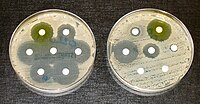
Photo from wikipedia
Acinetobacter baumannii is one of the most dangerous opportunistic pathogens in the global health care setup. Its drug resistance and biofilm-forming capability are often associated with chronic infections that are… Click to show full abstract
Acinetobacter baumannii is one of the most dangerous opportunistic pathogens in the global health care setup. Its drug resistance and biofilm-forming capability are often associated with chronic infections that are difficult to treat. Therefore, the clinical treatments for highly drug-resistant A. baumannii are limited. Antimicrobial peptides are broad-spectrum antibacterial agents combined with antibiotics that minimize selective bacterial resistance and enhance antibacterial efficacy. The current study evaluated the synergistic antibacterial activities of clinically important peptide antibiotics combined with other antimicrobials against nine extensively drug-resistant A. baumannii strains in planktonic and biofilm cells in vitro. Polymyxin B and E combined with imipenem showed 100% synergy in the planktonic cell with the checkerboard. Moreover, polymyxin E with rifampicin and bacitracin with imipenem or meropenem showed 100% additive effects. In the biofilm cell, polymyxin B and E combined with azithromycin showed 100% synergy, when vancomycin with azithromycin, rifampicin, and bacitracin with azithromycin or rifampicin, and teicoplanin with tigecycline or rifampicin, all showed 100% additive effects. Therefore, peptide antibiotics combined with other antimicrobials have synergistic or additive effects on extensively drug-resistant A. baumannii in planktonic and biofilm cells. In addition, the combination of polymyxins with carbapenems or azithromycin could be an ideal therapy against extensively drug-resistant A. baumannii infections.
Journal Title: Frontiers in Pharmacology
Year Published: 2022
Link to full text (if available)
Share on Social Media: Sign Up to like & get
recommendations!